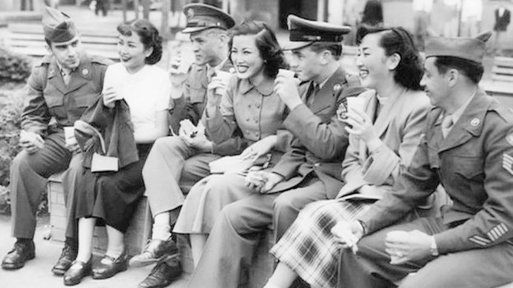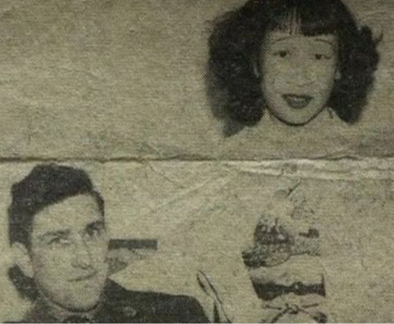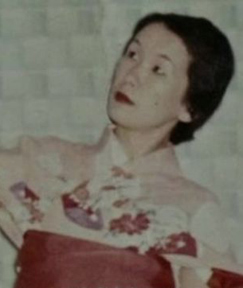Women who married the enemy
by Vanessa Barford
|

Japanese women socialising with American GIs |
Seventy years ago many Japanese people in occupied Tokyo after World
War Two saw US troops as the enemy. But tens of thousands of young
Japanese women married GIs nonetheless - and then faced a big struggle
to find their place in the US.
For 21-year-old Hiroko Tolbert, meeting her husband's parents for the
first time after she had travelled to America in 1951 was a chance to
make a good impression.
She picked her favourite kimono for the train journey to upstate New
York, where she had heard everyone had beautiful clothes and beautiful
homes.
But rather than being impressed, the family was horrified.
"My in-laws wanted me to change. They wanted me in Western clothes.
So did my husband. So I went upstairs and put on something else, and the
kimono was put away for many years," she says.
It was the first of many lessons that American life was not what she
had imagined it to be.
"I realised I was going to live on a chicken farm, with chicken coops
and manure everywhere. Nobody removed their shoes in the house. In
Japanese homes we didn't wear shoes, everything was very clean - I was
devastated to live in these conditions," she says.
"They also gave me a new name - Susie."
Like many Japanese war brides, Hiroko had come from a fairly wealthy
family, but could not see a future in a flattened Tokyo.
"Everything was crumbled as a result of the US bombing. You couldn't
find streets, or stores, it was a nightmare. We were struggling for food
and lodging.
"I didn't know very much about Bill, his background or family, but I
took a chance when he asked me to marry him. I couldn't live there, I
had to get out to survive," she says. Hiroko's decision to marry
American GI Samuel 'Bill' Tolbert didn't go down well with her
relatives.
|

Hiroko Tolbert and her former husband Samuel Tolbert |
"My mother and brother were devastated I was marrying an American. My
mother was the only one that came to see me when I left. I thought,
'That's it, I'm not going to see Japan again,'" she says.
Her husband's family also warned her that people would treat her
differently in the US because Japan was the former enemy.
War without mercy
More than 110,000 Japanese-Americans on the US West Coast had been
put into internment camps in the wake of the Pearl Harbour attacks in
1941 - when more than 2,400 Americans were killed in one day.
It was the largest official forced relocation in US history, prompted
by the fear that members of the community might act as spies or
collaborators and help the Japanese launch further attacks.
The camps were closed in 1945, but emotions still ran high in the
decade that followed.
"The war had been a war without mercy, with incredible hatred and
fear on both sides.
The discourse was also heavily racialised - and America was a pretty
racist place at that time, with a lot of prejudice against inter-race
relationships," says Prof Paul Spickard, an expert in history and
Asian-American studies at the University of California.Luckily, Hiroko
found the community around her new family's rural farm in the Elmira
area of New York welcoming.Some Japanese wives attended bride schools to
learn the American way of life and customs."One of my husband's aunts
told me I would find it difficult to get anyone to deliver my baby, but
she was wrong. The doctor told me he was honoured to take care of me.
His wife and I became good friends - she took me over to their house to
see my first Christmas tree," she says.
But other Japanese war brides found it harder to fit in to segregated
America.
"I remember getting on a bus in Louisiana that was divided into two
sections - black and white," recalls Atsuko Craft, who moved to the US
at the age of 22 in 1952.
"I didn't know where to sit, so I sat in the middle."
Like Hiroko, Atsuko had been well-educated, but thought marrying an
American would provide a better life than staying in devastated post-war
Tokyo.
|

Hiroko Furukawa |
She says her 'generous' husband - whom she met through a language
exchange programme - agreed to pay for further education in the US.
But despite graduating in microbiology and getting a good job at a
hospital, she says she still faced discrimination.
Facing rejection
"I'd go to look at a home or apartment, and when they saw me, they'd
say it was already taken. They thought I would lower the real estate
value. It was like blockbusting to make sure blacks wouldn't move into a
neighbourhood, and it was hurtful," she says.
The Japanese wives also often faced rejection from the existing
Japanese-American community, according to Prof Spickard.
"They thought they were loose women, which seems not to have been the
case - most of the women [in Toyko] were running cash registers,
stocking shelves, or working in jobs related to the US occupation," he
says.
About 30,000 to 35,000 Japanese women migrated to the US during the
1950s, according to Spickard.At first, the US military had ordered
soldiers not to fraternise with local women and blocked requests to
marry.
The War Brides Act of 1945 allowed American servicemen who married
abroad to bring their wives home, but it took the Immigration Act of
1952 to enable Asians to come to America in large numbers.
When the women did move to the US, some attended Japanese bride
schools at military bases to learn how to do things like bake cakes the
American way, or walk in heels rather than the flat shoes to which they
were accustomed.
But many were totally unprepared. Generally speaking, the Japanese
women that married black Americans settled more easily, Spickard says.
"Black families knew what it was like to be on the losing side. They
were welcomed by the sisterhood of black women. But in small white
communities in places like Ohio and Florida, their isolation was often
extreme."Atsuko, now 85, says she noticed a big difference between life
in Louisiana and Maryland, near Washington DC, where she raised her two
children and still lives with her husband.And she says times have
changed, and she does not experience any prejudice now.
"America is more worldly and sophisticated. I feel like a Japanese
American, and I'm happy with that," she says.
Hiroko agrees that things are different. But the 84-year-old, who
divorced Samuel in 1989 and has since remarried, thinks she has changed
as much as America.
"I learned to be less strict with my four children - the Japanese are
disciplined and schooling is very important, it was always study, study,
study. I saved money and became a successful store owner. I finally have
a nice life, a beautiful home.
"I have chosen the right direction for my life - I am very much an
American," she says.
But there is no Susie any more. Only Hiroko.
(This article is part of a BBC documentary Fall
Seven Times, Get Up Eight aired on BBC World News last weekend)
|

